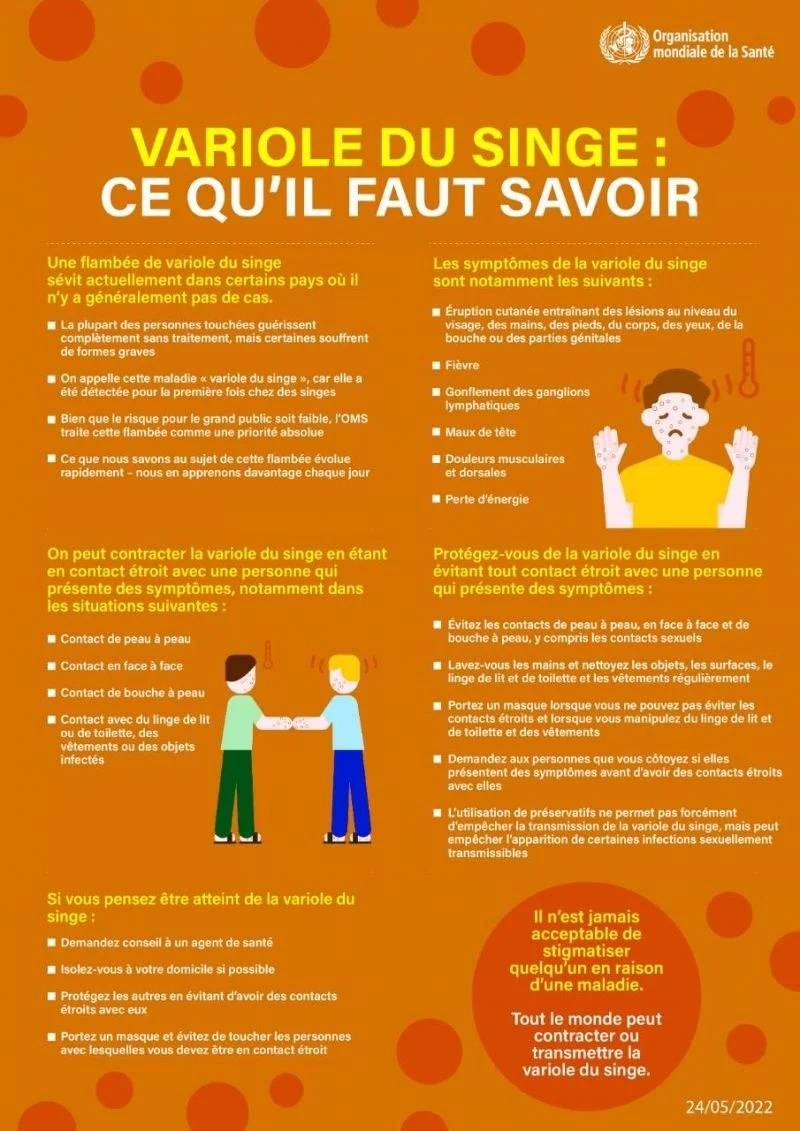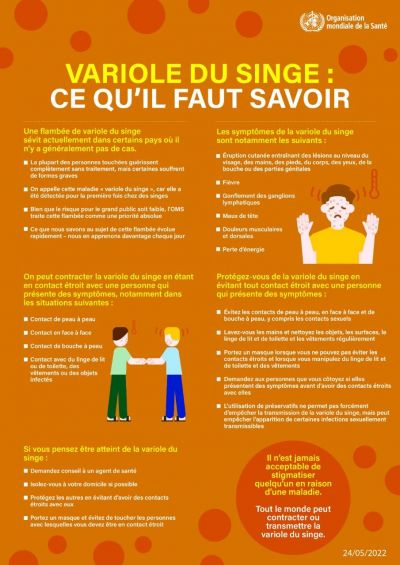
Everything you need to know about monkeypox according to the WHO.
“No cases of monkeypox have been reported in Lebanon for the moment,” a local official of the World Health Organization told L’Orient-Le Jour, a piece of information that adds to a series of good news.
In fact, according to the European Center for Disease Prevention and Control, “the probability of contagion in the population is generally very low.”
“In most cases, the disease is not serious. It disappears spontaneously after a few weeks,” according to WHO.
Two days ago, the technical lead for monkeypox at the United Nations, Rosemund Lewis said in a statement, “At the moment, we are not concerned about a global pandemic.”
She believes that the overall risk to public health worldwide is “moderate.”
Atypical case that raises questions
Vigilance is nevertheless required, as the disease, which appeared in the Congo and has been active in Central and West Africa for some 50 years, has recently been exported to Europe and North America.
Now observed in 23 countries where the disease is not endemic, it has more than 33 confirmed cases in France, more than 60 in Spain and more than 179 in the United Kingdom.
Moreover, WHO notes that the vast majority of cases are “atypical,” “with no direct travel links to an endemic area.”
“Early epidemiology of initial cases notified to WHO by countries shows that cases have been mainly reported amongst men who have sex with men (MSM),” the UN agency said.
Lewis’ concern is that individuals “can contract this high-risk infection if they do not have the information they need to protect themselves.”
This is indeed a high-risk infection, “which can lead to complications” and even “death in newborns and people with underlying immune deficiency,” according to the WHO.
It is in this context that the world, scalded by the Covid-19 pandemic that has caused the death of 13 to 17 million people since December 2019, is mobilizing to deal with monkeypox, possibly through a smallpox vaccination campaign for at-risk populations.
Monkeypox is a disease related to smallpox (the most severe form) and chickenpox (the least severe form).
Caused by the simian orthopox virus, it can be transmitted to humans by animals and can also be transmitted from one person to another.
Its symptoms resemble, but are less severe than, those observed in smallpox patients in the past, and usually disappear on their own without treatment: fever, severe headache, muscle pain, back pain, fatigue, swollen lymph nodes, skin rash or lesions.
Rashes are usually concentrated on the face, hands and soles of the feet, but can also appear in the mouth, eyes and genitals. They go through several stages before crusting and falling off.
Vaccinating at-risk populations against smallpox
Faced with this uncertainty, Lebanese authorities are preparing to face the virus.
“Lebanon is preparing for the arrival of monkeypox. It has asked the WHO to help it build a stock of smallpox vaccine,” Jacques Mokhbat, a specialist in infectious diseases and a member of the National Committee for Infectious Diseases, told L’Orient-Le Jour.
It should be noted that several smallpox vaccines offer some protection against monkeypox.
“It will be necessary to vaccinate people at risk, contact cases, the elderly, young children and immunocompromised people,” he added.
As a reminder, since smallpox has been eradicated, vaccination was stopped worldwide in the 1970s.
However, Mokhbat is reassuring: “There is no reason at this time to be concerned about a possible pandemic or global panic.”
And for good reason, “monkeypox is not transmitted through the air or through food,” but only “through close physical contact with a person showing symptoms, through clothing or objects contaminated by the virus,”or by a pregnant woman to the fetus through the placenta.
Moreover, “like all DNA viruses, it is a stable virus that does not mutate easily, unlike COVID-19, an RNA virus that can have several mutations,” Mokhabt explained.
Except that the WHO’s outline is not necessarily convincing to everyone.
“It is a fact that at this stage that monkeypox is not pandemic and does not seem to pose a serious danger,” Eid Azar, an associate professor of infectious diseases, told L’Orient-Le Jour.
But in the face of what he calls “political” WHO communications, he argues that “no one knows the viral dynamics of monkeypox at this point.”
And even if there is no sign of rapid transmission of the virus, and no need for panic, he believes that “the forms of transmission observed are bizarre” and that “the virus circulates to some degree outside the endemic area.”
"Without a doubt, it will arrive in Lebanon,” sooner or later. Hence the need "to keep an eye on the disease,” Azar said.
For the time being, it is therefore necessary to follow the sanitary instructions recommended by WHO, avoiding any close contact, including sexual contact, with a person who has symptoms or wearing a mask if contact is unavoidable.
It is also necessary to wash hands, surfaces, bed linen and clothes.
It is also necessary to ask the people you are in contact with if they have the symptoms of the disease.
Finally, WHO reminds us that the use of a condom does not necessarily prevent the transmission of monkeypox.
This article was originally published in French in L'Orient-Le Jour.
